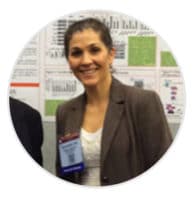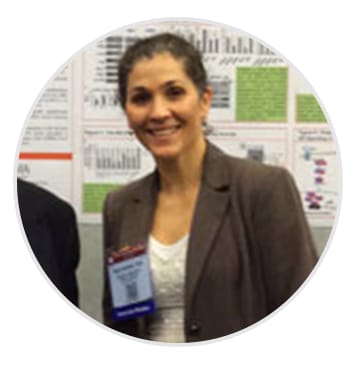Researcher Spotlight: Goldi Kozloski, PhD
Sylvester Cancer Center

Dr. Kozloski is a Postdoctoral Research Associate at the Sylvester Cancer Center at the University of Miami and a recipient of a 2012 Postdoctoral Fellowship Grant from the Lymphoma Research Foundation (LRF). Dr. Kozloski’s LRF funded project was presented in the poster session at the Annual Meeting of the American Society of Hematology (ASH) in December 2014. The project described the molecular mechanism of a microRNA in suppressing diffuse large B-cell lymphoma (DLBCL) tumor-growth, a potential novel agent for DLBCL patients.
Prior to her LRF project, Dr. Kozloski and her colleagues had found a link between high expression of a microRNA (a family of small RNAs which control various cellular processes) called miR-181a, and longer survival in DLBCL patients, but weren’t sure what biological mechanism was creating the correlation. Dr. Kozloski used the protected time provided by her LRF grant to determine that miR-181a acts as a “master regulator” of the NF-kB signaling pathway (which can contribute to the growth and survival of tumor cells) by repressing several of its signaling components. “When we forced miR-181a expression in DLBCL mouse models, the tumor-growth rate slowed, and the animal survival was prolonged compared to the control,” Dr. Kozloski says. The results of this research suggest that replacement therapy – introducing miR-181a cells to patients who have low expression of that microRNA – could be an effective new avenue of treatment. “Other microRNAs are already being tested in clinical trials and our work suggests that a similar therapeutic approach for miR-181a in DLBCL would be the next step in translating our discovery to the clinic.”
By presenting these findings at the ASH Annual Meeting, Dr. Kozloski was able to share her work with other researchers from around the world, and receive a variety of feedback. “This input accelerates the research study in that it often translates into more efficient study-techniques or tools, and the generation of strong-impact findings,” Dr. Kozloski notes. She acknowledges LRF’s funding as being pivotal in getting her research to this stage. “Especially during this time of research funding-shortage, being awarded the LRF Fellowship … helped propel my project, and as a result I presented my work in scientific meetings and my findings are now ready for publication review,” she says. “It is clear that the LRF support promoted my research and helped set me in a successful career track.”
Dr. Kozloski began her undergraduate studies in a pre-med program hoping to become a physical therapist, but soon found herself more interested in her molecular biology courses. After completing her PhD in biochemistry and molecular biology at the University of Miami, Dr. Kozloski joined the laboratory of Izidore Lossos, MD (an LRF Scientific Advisory Board member), at the University of Miami’s Sylvester Cancer Center to study the molecular mechanisms of DLBCL and other lymphomas. “I discovered that at the molecular level, lymphoma is an interesting disease and that certain logic in its pathogenic mechanism can be translated into improvement in patients’ outcomes,” she says. “Additionally, this research field is rich and stimulating, and there are lots of new findings and ideas to keep up with. Because it is always evolving, I am constantly challenged.” She advises new researchers to be persistent when faced with unsuccessful research, funding shortages, and other challenges, and to maintain a balance between the many aspects of a researcher’s professional life and their personal activities. Above all, Dr. Kozloski advises researchers to make sure they enjoy their work. “Although research is not easy, it is a fun, interesting, stimulating, and rewarding activity, so make sure that you keep this aspect as the motivation force to excel in your research.”

